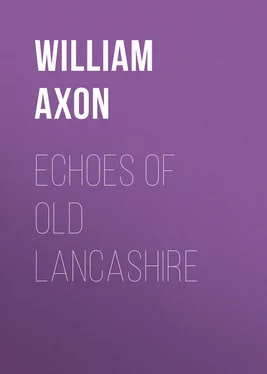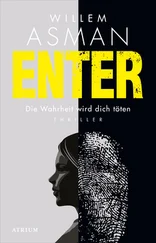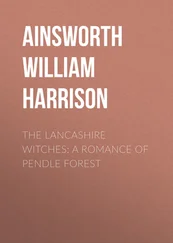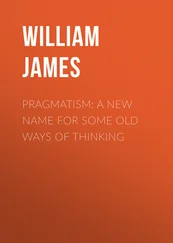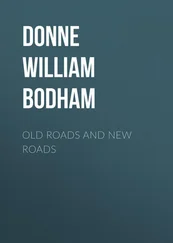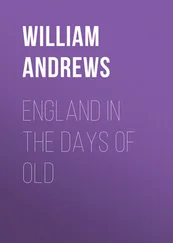William Axon - Echoes of old Lancashire
Здесь есть возможность читать онлайн «William Axon - Echoes of old Lancashire» — ознакомительный отрывок электронной книги совершенно бесплатно, а после прочтения отрывка купить полную версию. В некоторых случаях можно слушать аудио, скачать через торрент в формате fb2 и присутствует краткое содержание. Жанр: foreign_antique, foreign_prose, на английском языке. Описание произведения, (предисловие) а так же отзывы посетителей доступны на портале библиотеки ЛибКат.
- Название:Echoes of old Lancashire
- Автор:
- Жанр:
- Год:неизвестен
- ISBN:нет данных
- Рейтинг книги:3 / 5. Голосов: 1
-
Избранное:Добавить в избранное
- Отзывы:
-
Ваша оценка:
- 60
- 1
- 2
- 3
- 4
- 5
Echoes of old Lancashire: краткое содержание, описание и аннотация
Предлагаем к чтению аннотацию, описание, краткое содержание или предисловие (зависит от того, что написал сам автор книги «Echoes of old Lancashire»). Если вы не нашли необходимую информацию о книге — напишите в комментариях, мы постараемся отыскать её.
Echoes of old Lancashire — читать онлайн ознакомительный отрывок
Ниже представлен текст книги, разбитый по страницам. Система сохранения места последней прочитанной страницы, позволяет с удобством читать онлайн бесплатно книгу «Echoes of old Lancashire», без необходимости каждый раз заново искать на чём Вы остановились. Поставьте закладку, и сможете в любой момент перейти на страницу, на которой закончили чтение.
Интервал:
Закладка:
Echoes of old Lancashire
Preface
This volume is intended for those who find it pleasant, at times, to wander in the byways of topography and local literature. The development of Lancashire, especially in its relation to modern industrial life, has been told by more than one able historian, and all that is here attempted is to glean in the ample harvest fields. The bygone customs, forgotten worthies, outworn superstitions, historical episodes and travellers’ tales here recorded, will, it is hoped, not be without interest. If some of the articles seem more modern than the title would strictly justify, it must be remembered that the changes in the condition of the County Palatine have been so rapid that many things have become obsolete in the life time of the existing generation.
To several friends, and especially to the Rev. Dr. Casartelli and Mr. C. W. Sutton, thanks are due for various suggestions.
William E. A. Axon.Moss Side, Manchester.
The “Lancashire Plot.”
The town of Manchester was in a state of indignant and feverish excitement on the 17th of October, 1694, being the sixth year of the reign of William the Deliverer. Everywhere groups of townspeople were discussing the all-absorbing topic of the “Lancashire Plot,” for on that day there came to the town four of their Majesties’ judges, with every circumstance of pomp and parade, to try for their lives gentlemen of the best blood of Lancashire and Cheshire; unfortunate prisoners who were accused of having conspired against the Deliverer, of having been guilty of the treason of remaining faithful to the old King, whom the rest of the nation had cast off. The prisoners were brought into town strongly guarded, amidst the sympathetic demonstrations of their neighbours, who were equally liberal of groans and hisses for the wretched informers who were about to do their endeavour to bring them to the scaffold.
Lancashire, which in the civil war struck some hearty blows for the Parliament, was now a hotbed of disaffection. The old cavalier families, in spite of bitter experience of Stuart ingratitude, remained faithful in spirit to the exile of St. Germains; and the common people would have no love for King William, who was a foreigner, nor for Queen Mary, who sat upon the throne of her royal father, whilst he wandered a weary exile in a foreign land. The accused would have been pretty certain of sympathy had the public mind been convinced of the reality of the supposed conspiracy. How much more so, then, when it was shrewdly suspected that the charge had been trumped up by a gang of villains eager for blood-money, and supported by greater rogues anxious for a share of the estates which would be forfeited upon the conviction of their victims? Nor was the suspicion altogether groundless; covetous eyes were fixed longingly on these fine Lancashire acres, and the Roman Catholic gentry ran great danger of being defrauded of their inheritances.
In 1693, a commission sat at Warrington to inquire into certain lands and property alleged to have been given to “superstitious uses,” i. e. , to ascertain whether the Roman Catholic gentry had applied any portion of their estates or income to the promotion of their faith, or the sustenance of its ministers, and if they could be convicted of this heinous crime the property was confiscated, and one-third portion was to be the reward of the undertakers. So confident were these persons of their prey, that the plunder was prospectively allotted. As the result of this commission, where the defendants were not heard, the matter was carried into the Exchequer Chamber. Here it was pretended that at a meeting at the papal nuncio’s house, Lord Molyneux, William Standish, Thomas Eccleston, William Dicconson, Sir Nicholas Sherborne, Sir W. Gerard, and Thomas Gerard, had all promised money or lands for Popish uses. But the accusers had been very clumsy, for the falsehood of each separate item of the accusation was so abundantly proved, that the Government was forced to abandon all further proceedings.
When, therefore, in the next year, it was bruited about that a plot had been discovered to bring back King James and murder King William of Orange; that men had been enlisted, commissions received from St. Germains, arms bought and concealed in the old halls of Lancashire and Cheshire, and that those who had by the Warrington inquiry been in danger of losing their broad acres, were now also likely to lose their lives; men said, not unnaturally, that it was a base and horrible conspiracy against the Lancashire gentlemen; that this was the next move in the iniquitous game began at Warrington. If broken tapsters and branded rogues were to be encouraged in devoting to the traitor’s block gentlemen of rank and estate, whose life was safe?
Such was the state of feeling amongst the crowds which surrounded the Sessions House, opposite to where our present Exchange is erected. It was not until the 20th that the trial before a jury began. On that Saturday, Sir Roland Stanley, Sir Thomas Clifton, William Dicconson, Philip Langton, Esquires, and William Blundell, Gent., were placed at the bar and, in long verbose sentences, accused both in Latin and English generally of being false traitors to our Sovereign Lord and Lady, and specifically of having accepted commissions for the raising of an army from James II., late King of England. After the case had been opened, Sir William Williams, their Majesties’ counsel, called, as first witness, John Lunt, who was asked if he knew all the five men at the bar. Lunt, with front of brass, answered that he did know them all. Here Sir Roland Stanley cried out, “Which is Sir Roland Stanley?” Whereupon, to testify how intimately the informer was acquainted with them, he pointed out Sir Thomas Clifton! Great was the outcry in the court, which did not lessen when the judge bid Lunt take one of the officers’ white staves, and lay it on the head of Sir Roland Stanley, and he again indicated the wrong man. Being asked which was Sir Thomas Clifton, he unhesitatingly pointed out Sir Roland Stanley. Having thus shown his accuracy, he was allowed to proceed with his narrative of the plot. His evidence asserted that in 1689 one Dr. Bromfield, a Quaker, was sent by the Lancashire gentry to the court at St. Germains, to request King James to send them commissions, that they might enlist men for his service. Bromfield, being known as a Jacobite agent, it was determined to employ some one less known, and Lunt was pitched upon for the purpose. So, in company with Mr. Threlfall, of Goosnargh, he came over in a vessel which landed at Cockerham, that famous village where the devil dare not come. At the residence of Mr. Tildesley they separated, Threlfall went into Yorkshire to distribute commissions, and Lunt was summoned to attend a midnight meeting of the Lancashire Jacobites, held at the seat of Lord Molyneux, at Croxteth. Here the persons now accused were present, and many others, none of whom Lunt had ever seen before. The commissions were delivered, the health drunk of their Majesties over the water, and some little additional treason talked. At this point in the evidence Sir Roland Stanley remarked how improbable it was that he should accept a commission which might endanger his life and estate from an utter stranger. “But,” cries Lunt, “I brought you with your commission Dr. Bromfield’s letter.” Then the judge said to Sir Roland, “You are answered – that was his credentials;” but did not think fit to say that Lunt had made no mention in his depositions of this circumstance, which was evidently invented on the spur of the moment to confound Sir Roland Stanley. The judge also observed there was no great matter in Lunt not being able to point out the prisoners correctly. Lunt, thus encouraged by Sir Giles Eyre, proceeded with his veracious narrative – swore that the Lancashire gentlemen had given him money to enlist men and buy arms; that he beat up sixty men in London, who were quartered in different parts of the County Palatine; and particularised some persons to whom arms had been sent.
Читать дальшеИнтервал:
Закладка:
Похожие книги на «Echoes of old Lancashire»
Представляем Вашему вниманию похожие книги на «Echoes of old Lancashire» списком для выбора. Мы отобрали схожую по названию и смыслу литературу в надежде предоставить читателям больше вариантов отыскать новые, интересные, ещё непрочитанные произведения.
Обсуждение, отзывы о книге «Echoes of old Lancashire» и просто собственные мнения читателей. Оставьте ваши комментарии, напишите, что Вы думаете о произведении, его смысле или главных героях. Укажите что конкретно понравилось, а что нет, и почему Вы так считаете.
